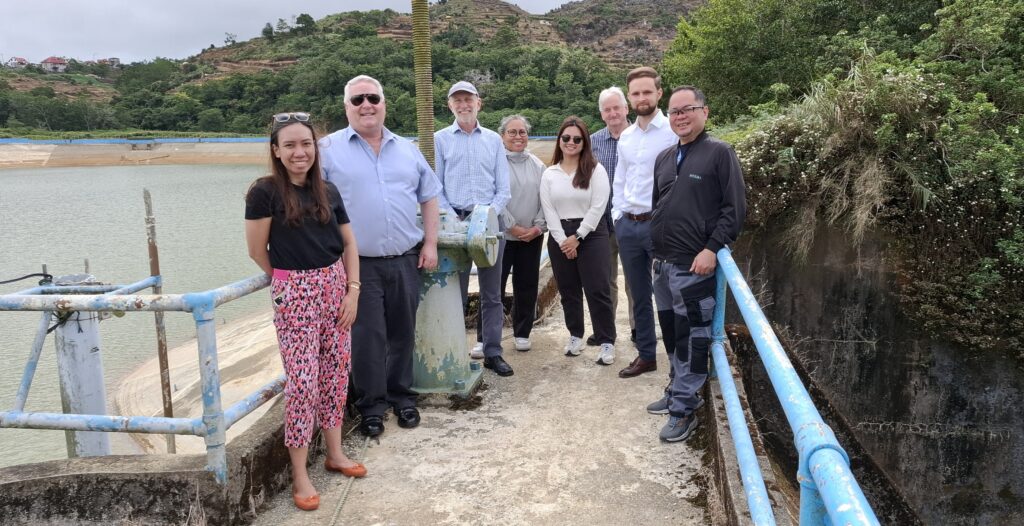- Critical site visits revealed urgent water system vulnerabilities in Baguio City amid climate challenges.
- GCIP’s diagnostic study identified a projected water supply gap of 117 million litres per day by 2055.
- Strengthened partnerships between the UK Government and Baguio City aim to secure a sustainable and inclusive water-resilient future.

Staff from the UK Government, British Embassy Manila and GCIP meet to assess water sites in Baguio.
As part of a strategic technical mission to advance water resilience the Green Cities and Infrastructure Programme (GCIP) focused on Baguio. The city is facing rising demand, diminishing water sources and increasing climate-related pressures that have brought its water system to a critical tipping point. In support of these efforts, Simon Stevens, Senior Responsible Officer, and Martin Johnston, Senior Technical Officer for GCIP at the UK’s Foreign, Commonwealth and Development Office (FCDO), travelled to the Philippines to engage directly with local stakeholders and assess the city’s water infrastructure on the ground.
During their time in Baguio, the delegation conducted site visits to several cornerstone infrastructure facilities shaping the city’s current water supply. These included the Sto. Tomas Rain Basin, which supplements surface water during dry seasons; the repurposed Busol Flood Basin, now bolstering rainwater storage; the KM 8 Water Treatment Plant, the city’s only full-process facility; and the BGH Reservoir, a vital distribution point for the central business district. These engagements provided the team with first-hand insight into both the opportunities and limitations of the existing system.
Later, the UK delegation joined the GCIP team in a high-level meeting with Baguio City Mayor, Benjamin Magalong, and Baguio Water District General Manager, Buddy Royeca. The meeting centred on the findings of GCIP’s diagnostic study, which projects a concerning water supply shortfall of at least 117 million litres per day by 2055. The discussion also highlighted sustainable supply schemes to address the deficit, new water source options and early environmental and social safeguards screening.
This work is instrumental to GCIP’s broader ambition to strengthen pipelines for climate-resilient and socially inclusive infrastructure investment. The feasibility study in Baguio demonstrates this by identifying diversified water sources, ensuring equitable access and embedding safeguards early in the planning cycle.
The local government has welcomed GCIP’s approach. Both the Baguio City Government and the Baguio Water District are signatories to a Memorandum of Understanding with the British Embassy Manila under GCIP. This collaboration has been praised as an essential step in solving a decades-old challenge of securing sustainable water for the city.
Baguio’s water supply has long depended on overburdened groundwater sources, leading to intermittent service and widespread reliance on private storage or costly bottled water. Climate change has exacerbated these issues, reducing groundwater regeneration and further compromising supply. The city’s growing population and booming tourism—recording over 1.3 million visitors in 2023—only add to the strain, particularly affecting low-income and vulnerable communities.
Through the GCIP Water Supply Project, the team aims to optimise both rainwater and groundwater systems to deliver safe, reliable and 100% on-demand water access. This is especially critical for groups most at risk, including women, children, the elderly and those living in poverty. By improving resource planning and understanding future climate impacts, the project is set to support a more resilient and inclusive urban water system.
With encouraging support from city leadership, GCIP will now proceed with the feasibility study’s next phases, ensuring that all environmental, social and poverty-related risks are addressed in future design and implementation. The continued partnership between GCIP, FCDO and Baguio City represents a shared commitment to build water resillience in the face of increasing water insecurity.
The UK’s Green Cities and Infrastructure Programme is tackling climate change and extreme poverty by accelerating the delivery of sustainable green cities and climate-resilient infrastructure.
Published
11/04/25
